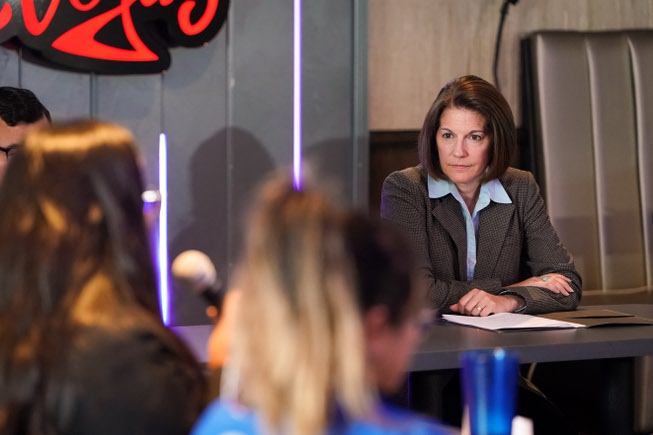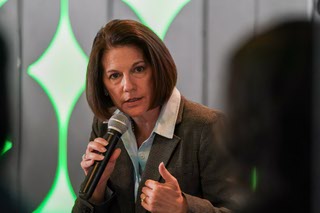
Senator Catherine Cortez Masto listens to Dreamers at El Cevichazo in Las Vegas, to discuss their concerns with the 5th Circuit Courts decision to potentially upend the DACA program, which protects 11,500 Dreamers across Nevada. Wednesday, Oct. 12, 2022. Brian Ramos
Thursday, Oct. 13, 2022 | 2 a.m.
Like many undocumented immigrants living in America, Las Vegan Iris Vargas goes about her daily routine with the fear of being deported.
Those anxieties started when she was 12, she said, when she fled Mexico with her mother to escape domestic violence.
In the 16 years since, Vargas — now 28 — went to great lengths to put herself through college and land a paralegal job. She’s finishing up a political science degree at UNLV with ambitions of attending law school.
“I was working three jobs just to pay for my community college tuition,” she said. “I was taking naps in my car at the library just between jobs, doing homework during my breaks.”
Despite her otherwise seemingly bright future, Vargas said she had no choice but to make contingency plans in the event she was forced to return to Mexico amid a ruling earlier this month by the 5th U.S. Circuit Court of Appeals ruling the Obama-era immigration program called Deferred Action for Childhood Arrivals, or DACA, could no longer accept new applicants. Vargas is a DACA recipient.
The program gives immigrants a work visa and protection from deportation. The American Immigration Council says there are 832,881 DACA recipients.
The court’s decision stopped short of ruling the program illegal, but it ordered a lower court to review revisions made to the program by the Biden administration that prevented the deportation of hundreds of thousands of immigrants brought to the U.S. as children, according to The Associated Press.
Vargas and six other “Dreamers” — the term is based on never-passed proposals in Congress called the DREAM Act — were joined Wednesday by Nevada Democratic Sen. Catherine Cortez Masto at a roundtable in downtown Las Vegas to detail their fears.
Cortez Masto, the first-ever Latina elected to the Senate and who is fighting for re-election against Republican Adam Laxalt in the Nov. 8 midterms, has pushed for lawmakers to pass a bill providing a pathway to permanent citizenship for DACA recipients.
“Dreamers grew up here, they work here, and they’ve built their lives here,” Cortez Masto said. “They are a vital part of our community and their voices belong at the table in Washington and at home in Nevada. There are a lot of people who are playing politics with their lives and now is the time for us to call them out.”
Nevada is home to about 11,500 Dreamers, many of whom were essential workers who helped the state navigate the COVID-19 pandemic, she said. There has been little action by Congress on the issue since the U.S. Supreme Court issued a ruling in 2019 that dismissed a challenge to DACA by ex-President Donald Trump. But Cortez Masto said there could be a vote later this year in the Senate during the lame duck session on a bill that would codify DACA protections.
“We can get it done with a 60-vote threshold, maybe, because there isn’t election year politics during the lame duck, and some of my Republican colleagues will have the courage to come forward and do the right thing on this issue,” she said. “I’ve seen us come so close under the previous administration to get something done in a compromise bill.”
Cortez Masto was referring to the 115th Congress in 2018 when four bills — including one with bipartisan support — to protect DACA recipients failed to get enough votes to advance in the Senate.
But even if lawmakers could come to an agreement, some at the roundtable were skeptical it would change their status.
Norma Ramirez, a clinical psychologist, said she and her family moved to Las Vegas from Mexico when she was 5, and that she’s always felt like an outcast in social circles. She told Cortez Masto that she’s tired of feeling like she has to look over her shoulder.
“We all deserve to have full human lives,” Ramirez said. “I don’t want to just have documents so that I can work. I want to actually be able to travel. I want to enjoy my life.”
The same rang true for Anna Ledesma, who came from the Philippines with her parents when she was 7. After her father’s work visa expired, the family stayed in the U.S.
Now a pediatric nurse, Ledesma said she was on-call during the mass shooting in Las Vegas on Oct. 1, 2017, in which 58 people were immediately killed and hundreds more were injured. That, she said, has tied her to the local community forever and leaving would mean leaving the place she calls home.
“I want to continue doing what I do permanently, without the shadow of the two-year limit we currently have,” Ledesma said, referring to the program’s renewal period every two years.
For Jesus Lares, being a DACA recipient meant he was able to achieve the American dream, he told Cortez Masto.
Lares was brought to Las Vegas by his Mexican parents when he was just 3 months old, he said. He’s lived in the valley his entire life, and works as an apprentice with the International Brotherhood of Electrical Workers and has a family of his own.
“I’m very proud of where I’m at now,” he said. “Thanks to DACA, I made the American dream. Working a blue-collar job, I feel like I’m making enough money to support my family.
“I wouldn’t trade it for anything in life.”

